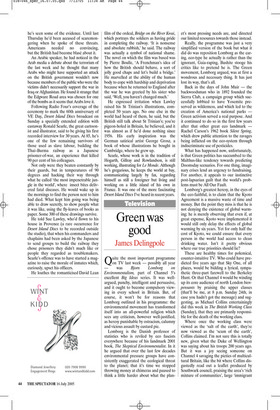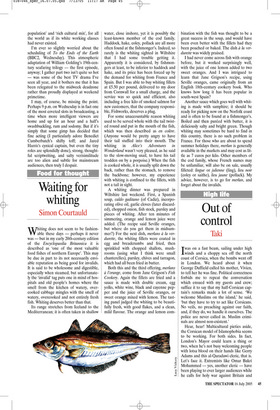Television
Green was good
James Delingpole
Quite the most important programme on TV last week — possibly all year — was Bjorn Lomborg on Environmentalism, part of Channel 5’s excellent Big Ideas series. It was wellargued, punchy, intelligent and persuasive, and it ought to become compulsory viewing in every school in Britain. But, of course, it won’t be for reasons that Lomborg outlined in his programme: the environmental movement has transformed itself into an all-powerful religion which sees any criticism, however well-justified, as heresy punishable by ostracism, calumny and vicious assault by custard pie.
Lomborg is the Danish professor of statistics who is reviled by eco fascists everywhere because of his landmark 2001 book, The Skeptical Environmentalist. In it he argued that over the last few decades environmental pressure groups have consistently exaggerated the ecological threat to the planet; that it’s time we stopped throwing money at chimeras and paused to think a little harder about what the plan et’s most pressing needs are, and directed our limited resources towards those instead.
Really, the programme was just a very simplified version of the book but what it did do was reposition Lomborg as the caring, eco-type he actually is rather than the ignorant, Gaia-raping, Bushite stooge his critics like to pretend he is. The Green movement, Lomborg argued, was at first a wondrous and necessary thing. It has just lost its way, that’s all.
Back in the days of John Muir — the backwoodsman who in 1892 founded the Sierra Club, a campaign group which successfully lobbied to have Yosemite preserved as wilderness, and which led to the creation of America’s national parks Green activism served a real purpose. And it continued to do so in the first few years after that other great eco landmark Rachel Carson’s 1962 book Silent Spring, which drew public attention to the ravages being inflicted on the eco-system through indiscriminate use of pesticides.
What has happened now, unfortunately, is that Green politics has succumbed to the Malthus-like tendency towards predicting Doomsday scenarios. For one thing, imaginary crises lend an urgency to fundraising. For another, it appeals to our instinctive post-lapsarian guilt that the world’s problems must be All Our Fault.
Lomborg’s greatest heresy, in the eyes of the eco-faithful, is to claim that the Kyoto Agreement is a massive waste of time and money. But the point they miss is that he is not denying the existence of global warming; he is merely observing that even if, at great expense, Kyoto were implemented it would still only delay the effects of global warming by six years. Yet for only half the cost of Kyoto, we could ensure that every person in the world had access to clean drinking water. Isn’t it pretty obvious where our true priorities should lie?
These are healthy times for polemical, counter-intuitive TV. Who could have predicted five years ago that Sky One, of all places, would be bidding a lyrical, sympathetic three-part farewell to the Berkeley Hunt. Or that Channel 4 would be winding up its core audience of north London bienpensants by praising the upper classes (that’ll be me, at 8 p.m. Sunday 24th, in case you hadn’t got the message) and suggesting, as Michael Collins entertainingly did this week in The British Working Class (Sunday), that they are primarily responsible for the death of the working class.
Where once the working class were viewed as the ‘salt of the earth’, they’re now viewed as the ‘scum of the earth’, Collins claimed. I’m not sure this is totally new, given what the Duke of Wellington was saying about his troops 200 years ago. But it was a joy seeing someone on Channel 4 savaging the pieties of multicultural Britain, like the bit where Collins disgustedly read out a leaflet produced by Southwark council, praising the area’s ‘rich mixture of communities’, large ‘immigrant population’ and ‘rich cultural mix’, for all the world as if its white working classes had never existed.
I’m ever so slightly worried about the scheduling of To the Ends of the Earth (BBC2, Wednesday). This atmospheric adaptation of William Golding’s 19th-century seafaring trilogy — the first episode, anyway; I gather part two isn’t quite so hot — was some of the best TV drama I’ve seen all year, and it bothers me that it has been relegated to the midweek deadzone rather than proudly displayed at weekend primetime.
I may, of course, be missing the point. Perhaps 9 p.m. on Wednesday is in fact one of the most coveted slots in broadcasting, a time when more intelligent viewers are home and up for an hour and a half’s swashbuckling, rum and sodomy. But if it’s simply that some gimp has decided that fine acting (I particularly adore Benedict Cumberbatch’s shifty toff; and Jared Harris’s cynical captain, but even the tiny roles are splendidly done), strong, thoughtful scriptwriting, and salty verisimilitude are too alien and subtle for mainstream audiences, then truly I despair.



























































 Previous page
Previous page